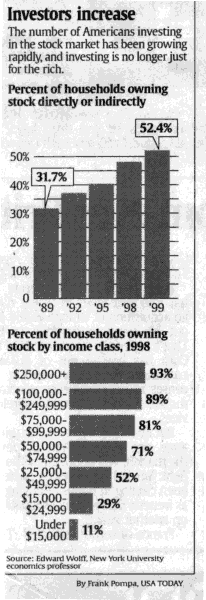
Poll Americans see increasing economic divide
In Bristol many of our residents never saw the so-called "boom" of the 90's and in fact many residents watched their jobs and futures move to Mexico. Because much of Appalachia has no real middle class or many people with a lot of money, the 90's were something many of us watched on television. Because most of the wealth generated in the 90's was from investments and the stock market (fueled by downsizing and driving down wages) working people lost out on both counts. With a median family income of about $15,000 in Bristol (less than this in many surrounding counties) the chart to the left tells the whole story. For more on our community see Income Gap Grows in Virginia
Associated Press
WASHINGTON - The economic boom of the 1990s improved the financial outlook for upper middle class and wealthy Americans, but it had little impact on the outlook or financial condition of those who make less money, a poll says. "The boom has passed these people by," said pollster Andrew Kohut, director of the Pew Research Center for the People and the Press.
Americans increasingly see an economic divide between the haves and have-nots, according to the poll, released Thursday. Overall satisfaction with the country's direction has fallen in the past six months, with 43 percent now saying they're satisfied and 52 percent saying they're dissatisfied. That drop-off from a 55-41 positive split in January was led by a decline among women and minorities.
The number of people who think the country is divided between those who have enough and those who don't has grown steadily and now is at 44 percent - up from 26 percent in 1988. Just over four in 10 in the new poll thought President Bush was mostly concerned with helping those who have enough, while one in 20 said he was interested in helping those who don't. Four in 10 said he was treating both groups about the same.
The president has pitched his recently passed tax cut as a way to help all Americans, but six in 10 said they hadn't thought about getting their income tax refunds. Just over a third said they were looking forward to it. Less than half, 44 percent, now say they are in good or excellent financial shape personally, a drop of 8 percentage points from a year ago. "The economic gains the middle class have made seem to be very much threatened by the credit crunch and by energy costs," said Kohut.
The number of people who say they have more debt than they can afford to owe has grown from a fifth of Americans in 1992 to almost three in 10 in 2001. More than a third of those who have family incomes of less than $50,000 said they have credit card and loan debts that are more than they can afford. A fourth of people in the survey said not having enough money to make ends meet was the biggest problem facing them and their families. High prices were right behind that.
The poll of 1,200 people was taken last Wednesday through Sunday and had an error margin of plus or minus 3.5 percentage points. Those at the lower end of the economy saw few signs of economic progress. "The survey gives a lot of evidence that poor people remain about as poor as they were in the early 1990s," Kohut said. The numbers who said they didn't have enough money for food, clothes and health care were all up slightly from other polls taken over the past two decades. However, middle-income and wealthy people said it is now easier for them to afford housing, appliances and vacations.
Some other findings from the poll:
Women were more concerned about rising prices than men.
Four in 10 Americans now say there are plenty of jobs available, up from one in 10 who felt that way eight years ago. Those from wealthy households were twice as likely to feel that way as those with low incomes.
Blacks, Hispanics and other minorities were more likely than whites to struggle with economic issues, even when compared with whites in the same economic ranges.
Copyright 2001 Associated Press.
Published June 22, 2001
A Deist Viewpoint